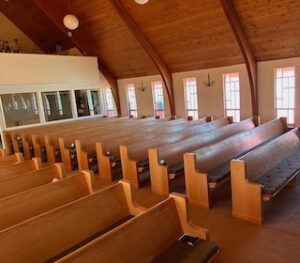[from a message preached at the worship of our local Ministerial Association on March 15, 2024]
My daughter–our first born–was just a few months old when I discovered that parenthood is a competitive sport, or at least it was being treated that way by a whole lot of us.I began to see how we moms quietly pitted ourselves and our kids against each other. Whose baby walked first? Which growth percentile is our child is? 98th percentile—that’s an A+, right? Whose toddler had the biggest vocabulary? Who could read first? On and on and on, and it only exploded with social media.

I got tired of it by the time my kids were in high school. I sat my kids down. I said, “Here’s the thing: I love you, and I’m grateful for your accomplishments, really, but I am dropping out of this Facebook contest with my fellow moms to see whose kid made varsity, whose kid made the honor roll, whose kid did blah blah blah blah blah. I’ll post the big stuff. When you get into college, I’ll be all over it, but, short of that, I’m out.”
Elly gave me an understanding nod, Karl just looked confused, and I breathed a sigh of relief.
I’m not claiming innocence, only exhaustion. I was a part of it too.
And when I was part of it, I rationalized it. I said, “I’m just proud of my kids.” That’s fair. But was I comparing my kids to other kids? Of course, I was. Was I wondering if I was doing something wrong as a mom when these other moms seemed to have more successful kids? Sadly, yes.
It was a competition, whether we were all willing to admit it or not. So, what’s the big deal? What’s wrong with a little competition?
Nothing. There’s nothing wrong with competitiveness when we’re actually competing. In a baseball game, in a race, in a chess match, i.e. competitions, competitiveness is good.
In relationships, in communities, in churches, in matters of faith, not so much.
If we have any doubt, we need only look to Jesus’ disciples, who struggled themselves with competitiveness. Remember the end of Luke 9, when
The disciples are caught comparing themselves one from another, competing for this title of “greatest.” This term “greatest” could be understood in any of several ways:
Greatest could be about “having the most authority, receiving the most preferential treatment, being the most valuable, or being most favored by God” (Robert H. Stein, Luke, New American Commentary 24 [Nashville, TN: B & H Publishing, 1992], 293). Whatever greatness was, they wanted it.
Keep in mind that this conversation between Jesus and his disciples comes on the heels of another conversation in which they completely misunderstand the prediction he makes of his own death.
Two verses earlier, in Luke 9: 44, Jesus says, “Listen carefully to what I am about to tell you: The Son of Man is going to be delivered into the hands of men.”
The disciples don’t understand that they’re being called to a measure of “greatness” that mimics the sacrifice Jesus is about to make. There’s no room for protecting their privilege to exorcize demons or do anything else for that matter, not when the cross is on the horizon, the cross where Jesus’ greatness will be properly understood.
To prepare for that cross, as followers of Jesus, we have to get rid of all the world’s ideas about achievement and success. Like children, like the least of these, followers of Jesus are to humble themselves. That’s how we’ll really be great.
Because, you see, the real sin behind this sin of competitiveness is pride. Pride keeps us competing for first place in contest of our own making.
In Chapter 8 of Mere Christianity, C. S. Lewis called pride “the great sin.” Pride is the sin that lurks behind all the other sins, though few of us ever acknowledge it, let alone claim it.
Lewis wrote–
Now what you want to get clear is that Pride is essentially competitive – is competitive by its very nature – while the other vices are competitive only, so to speak, by accident. Pride gets no pleasure out of having something, only out of having more of it than the next man. We say that people are proud of being rich, or clever, or good-looking, but they are not. They are proud of being richer, or cleverer, or better-looking than others. If someone else became equally rich, or clever, or good-looking there would be nothing to be proud about. It is the comparison that makes you proud: the pleasure of being above the rest.
But no, Jesus says, humility and service are the way to greatness. Lowering ourselves is the way to uplift ourselves. Death is the way to life. It was totally and completely countercultural back then, and it’s totally and completely countercultural now.
If we want to be ready for Good Friday, if we want to be able to truly celebrate on Easter morning, we’ve got to be ready now. As followers of Jesus, just like the disciples, we prepare ourselves for the cross by humbling ourselves, drawing the circle wide, and dropping the endless efforts to be the best, the great-est, the shiny-est, the strong-est, the smart-est, the most whatever-est.

Allow me to gently suggest that one of ways we might humble ourselves and draw the circle wide, is to drop the competition between churches.
Yes, churches compete. Not all the churches, not all the time, but we do it. Let’s just own up and admit it.
Here’s what church leaders and members look like when we’re competing:
- We compare numbers. How many people in worship? How big is your youth group? Sunday school attendance?
- We compare programs. You’ve got BSF? Well, we’ve got MOPS.
- We pilfer recruit from each others’ churches. It’s one thing if there are actual problems at a church, but when folks are just trying to get some other church’s members to switch to bolster their own attendance numbers (see above), I just don’t know what to say.
- We recycle the same few hundred people from one church to the other to the other. But, boy, while we’ve got the numbers, doesn’t it feel great to be the biggest, to have the most cars in the parking lot, the biggest youth group…
We end up fostering a really unhealthy kind of faith consumerism within our community.
Here’s Josh Reavis, writing for Lifeway Research:
We can all be jealous over our flock, but it’s important to remember that the fear of losing members is a terrible motivation for ministry. Your church is a part of the Church in your town. Each congregation has unique strengths and resources that meet particular needs within that community. It’s liberating when you embrace the truth we’re not competing entities, but members of the same organism—the Bride of Christ. Your church may not be for everybody, but it’s for somebody.
Friends, competitiveness is fine in competitions, but the Kingdom of God is not a football field or a tennis court or a courtroom or a race. We do one another, the church, and our Savior Jesus Christ no favors by acting as if it is.
No, friends. In the immortal words of High School Musical and the apostle Paul, “We’re all in this together.”
All the way to the cross.



Leave a Reply